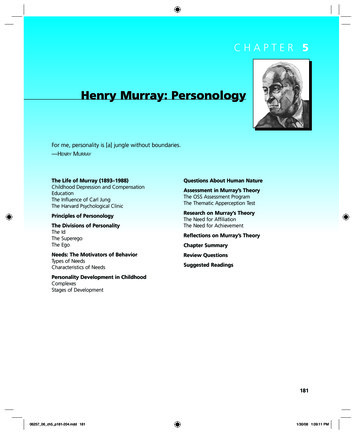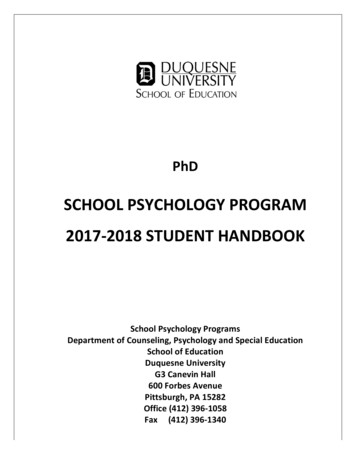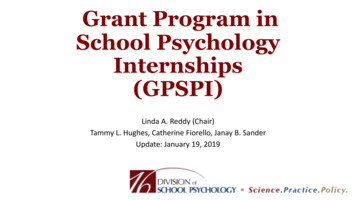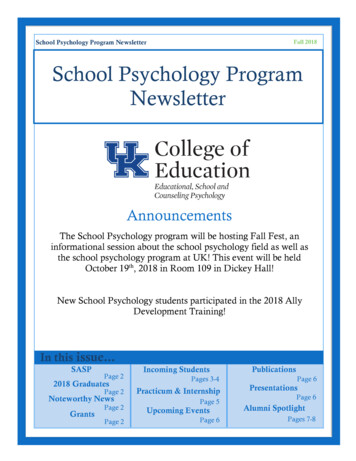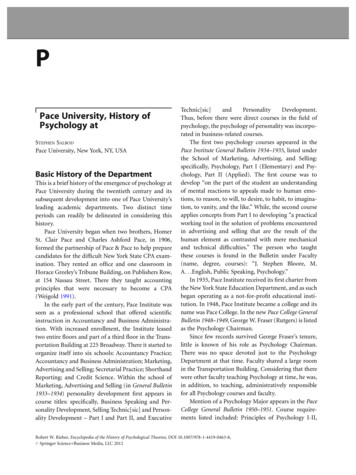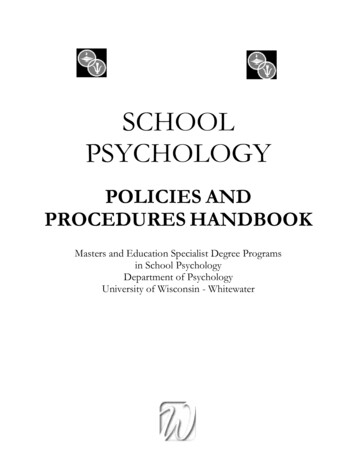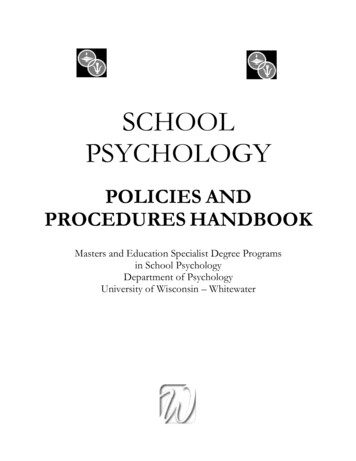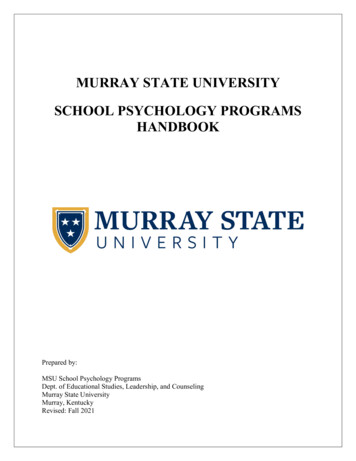
Transcription
MURRAY STATE UNIVERSITYSCHOOL PSYCHOLOGY PROGRAMSHANDBOOKPrepared by:MSU School Psychology ProgramsDept. of Educational Studies, Leadership, and CounselingMurray State UniversityMurray, KentuckyRevised: Fall 2021
TABLE OF CONTENTSI.INTRODUCTION4II.PURPOSE OF THE PROGRAM HANDBOOK5III.GENERAL INFORMATIONA. Program DescriptionB. Program Mission, Philosophy, and GoalsC. Degree OptionsD. NASP Standards and Program CompetenciesE. Required Courses that Meet Competencies5667811IV.PROGRAM RESOURCESA. MSU Campus and CommunityB. College of Education and Human ServicesC. School Psychology Programs and Initiativesa. Graduate Programsb. Counseling and Assessment Centerc. Center for Autism Spectrum Disordersd. Assessment and Intervention Materials Librarye. School Psychology ClubD. School Psychology Faculty13131414141515161920STUDENTSA. Application/Admission RequirementsB. Financial SupportC. Joining Professional Organizations21212222COURSE OF STUDYA. Course RequirementsB. Course WaiversC. Elective CoursesD. Annual Program ActivitiesE. PracticumF. InternshipG. Student Portfolio2323232424252628ACADEMIC POLICIES AND PROCEDURESA. Faculty AdvisorB. Continuous EnrollmentC. Satisfactory Academic ProgressD. Grievance Procedures3030313132V.VI.VII.2
VIII.IX.PROCEDURAL GUIDELINESA. Student-Faculty RelationsB. Evaluation of Student Progress and Professional CompetenciesC. Assessment and Evaluation SystemsD. Annual Student EvaluationE. Portfolio AssessmentF. Student Evaluation of the ProgramG. Competency ExamH. Remediation, Withdrawal, and Dismissal Procedures333333343535363637FORMSAPPENDIX A. Student Portfolio Evaluation ComponentsAPPENDIX B. Faculty Ratings of Student CompetenciesAPPENDIX C. Student Portfolio Scoring FormAPPENDIX D. Student Self-Assessment FormAPPENDIX E. Assessment PlanAPPENDIX F. Course MatrixAPPENDIX G. Student Portfolio Action PlanAPPENDIX H. Student Remediation PlanAPPENDIX I. Student Practicum ContractAPPENDIX J. Practicum Field Supervisor Role and ContractAPPENDIX K. Supervised Fieldwork LogAPPENDIX L. Practicum Student Evaluation Form4046515258606162646566713
I. INTRODUCTIONWelcome to the School Psychology Programs at Murray State University! This handbook shouldbe helpful for answering preliminary questions and to assist you in planning your course of studyin the graduate program. It is also provided to faculty for advising and course planning purposes.It includes the program model and philosophy, goals and objectives, as well as the curriculumplan. Academic, fieldwork, and program expectations are briefly described. Program resources,policies and procedures are also included.The handbook is designed to make your experience in our programs more organized, productive,and enjoyable. Please read all sections of the handbook so as to become thoroughly familiar withthe School Psychology Programs and College of Education and Human Services. Use thehandbook as well as the graduate catalog as a guide, but keep in mind that while it iscomprehensive, it is not exhaustive. Please consult with your advisor, your committee chair,program director, and more advanced graduate students regarding any questions or concerns youmight have. Final program and student decisions rest with the School Psychology faculty.Information regarding university regulations and services can be found on the MSU Home Pageat murraystate.edu where you can access from the library or computer labs on campus or yourhome computer. You also have access to e-mail through the university. Be sure to remember theweb whenever you need information on research, student services and organizations, the library,etc.Welcome! We’re glad you’re here! We look forward to working with you and hope yourgraduate studies here are exciting, productive, and satisfying.4
II. PURPOSE OF THE PROGRAM HANDBOOKThe School Psychology Programs handbook is designed to provide students with information forsuccessful enrollment throughout their studies in our programs at Murray State University.Please find included in the handbook policies and procedures set forth by the program, theCollege of Education and Human Services, and Murray State University. Needed informationthat is not included in this handbook can be provided by faculty advisors, the program director,or one of the following sources:Murray State University Academic /Murray State University Student Life Policies and StudentAffairs/policies.aspxYou should become well acquainted with all relevant policies and procedures contained inhandbooks and catalogs provided by the School Psychology Programs and Murray StateUniversity. Please save this handbook as a source of reference throughout your graduate studies.Keep in mind that this document is intended as a supplement to regular consultation with theprogram director and a faculty advisor. The MSU School Psychology Programs Handbook isupdated and revised on a regular basis.III. GENERAL INFORMATIONThe MSU School Psychology Programs are currently housed in the Educational Studies,Leadership, and Counseling (ELC) department in the MSU College of Education and HumanServices. The ELC department also oversees programs in Counseling, Education Administration,Human Development and Leadership, Postsecondary Education, and P-20 and CommunityLeadership with Dr. Samir Patel serving as the Department Chair. The program leads to anEducation Specialist (Ed.S.) Degree in School Psychology or a state-level practice endorsement(6th Year Recertification Program). We also oversee a KY testing endorsement (IndividualIntellectual Assessment Endorsement) for school counselors.Upon admission to the School Psychology Programs, you will be assigned a faculty advisor whowill work closely with you throughout the program. Your faculty advisor is responsible forguiding your selection of courses and assisting you with the technical aspects of your graduateprogram (e.g., paperwork, elective courses). Make an effort to get to know your advisor and theentire School Psychology Faculty as soon as possible. It is expected that you will take theinitiative in seeking out your faculty advisor when necessary. Schedule meetings with youradvisor to discuss your transition to graduate school, program requirements, professionalinterests, and future career goals. You may choose to change your faculty advisor if you wish.We believe it is important to select an advisor that you are both comfortable with and shares yourprofessional interests and goals.Communication within the program occurs through various means and is designed to enhanceyour understanding of course and practicum requirements, program policies, changes that occur5
in the program, and issues such as certification that effect your future as a school psychologist. Aprimary means of communication is use of the program listserv and notices that are sent by theprogram director via university email. A program orientation meeting is held for all new studentseach semester with additional program meetings scheduled at the discretion of the programdirector. Each student has an MSU email address assigned to them once they are admitted intothe program. Students are advised to check their MSU email account on a regular basis. Duringyour graduate study, it is important that we maintain an accurate address, telephone number, anduniversity email address for you. These should be given to the program director before each fallsemester.The School Psychology Programs faculty meet on a regular basis to plan program activities,discuss needs and issues, review student progress, and engage in short-term and long-termplanning. This committee also discusses program policies and procedures in relation to the ELCDepartment, the College of Education and Human Services, and Murray State University. Inaddition to School Psychology Programs faculty, students are both welcomed and encouraged toattend program meetings. A set portion of each meeting will be set aside to share newinformation, ask questions, and offer suggestions for bettering the program. Program meetingtimes will be advertised to students at the beginning of each semester.IV. PROGRAM DESCRIPTIONThe MSU School Psychology Programs prepare school psychologists as practitioner-scholarswho, through their services, promote the psychological and academic development of childrenand youth. Specialist training in the School Psychology Programs consists of 60 graduate credithours including the following: Didactic courseworkPracticumYear-long internshipStudent portfolio (Ed.S. only)Annual evaluationsThe School Psychology Programs are approved by the National Council for Accreditation ofTeacher Education (NCATE), Council for the Accreditation of Educator Preparation (CAEP) andare currently in the process of applying for national approval with the National Association forSchool Psychologists (NASP).Program Mission, Philosophy, and GoalsOur program’s mission is to equip school psychology practitioners with the expertise needed tofacilitate the development and well-being of all children and youth through direct and indirectservices.Our philosophy is that school psychologists are highly-trained professionals who advocate forstudents’ right to learn and be treated justly, promote effective practices, and work to removebarriers that impede lifelong success. Success refers not only to accomplishment of immediate6
goals but also to long-range goals of adulthood such as maximizing personal potentials, wellness,meaningful work, and contributing to society. School psychologists are important agents whoassist learners, families, teachers, and others with educational and personal advancement.Ultimately, our program emphasizes prevention and intervention services related to thedevelopmental, educational, and mental health needs of all learners.Our programs are conceptualized as a practitioner-scholar operational model that focuses on thepractical application of scholarly knowledge through synthesis and dissemination of currentresearch and technologies in applied settings. As practitioner-scholars, students will develop asolid foundation of content knowledge in core areas of psychology, education, research methods,and professional school psychology. School psychology students will learn to effectively utilizethis body of evolving knowledge to prevent, assess, and intervene regarding psychological andeducational issues impacting children, families, and institutions. Program faculty strive todemonstrate that scholarly and applied practice roles are not distinct but, instead, are inextricablylinked when considering the work of school psychologists across a diverse range of practicesettings. The scientific, evidence-based orientation to practice is emphasized at all levels of theprogramOur programs utilize four overarching goals that drive the required coursework, practica, andprofessional activities that are required during the program. The goals of our programs are to: (1)instill a broad knowledge base of psychological and educational foundations that support schoolpsychology practice, (2) mentor the evaluation, application, and extension of this knowledgeacross all aspects of school psychology practice, (3) educate students on how to provide schoolpsychological services within complex systems that are informed by contemporary technologieswhile respecting individual differences, and (4) emphasize, above all else, school psychologicalpractice that is scientific, defensible, and ethical.We are committed to preparing future school psychologists to assume professional leadershiproles in school, clinical, and other community settings. Across these settings, schoolpsychologists work to ensure positive educational outcomes for all children and youth, andutilize their professional knowledge and skills to function as change agents. School psychologistshelp others understand and attain their educational, legal, and individual rights and work topromote change at various levels. To fulfill these critical roles, our students will developcompetencies that sustain their ability to provide a comprehensive range of direct and indirectpsychological services to children, youth, their families and educators. This includes competencyto use a wide variety of assessment methods, to consult with families, educators and otherprofessionals, to design and implement direct and indirect interventions tailored to individual andgroup needs, to develop prevention and other intervention programs that promote optimaldevelopment, and to evaluate the effectiveness of interventions, programs, and other schoolpsychological services.Degree OptionsMSU currently offers two graduate degree and certificate programs in school psychology that aredesigned to appeal to a broad audience of students, educators, and mental health practitioners.7
Ed.S. Degree in School Psychology. The Specialist in Education degree in School Psychology isa 60-hour program that is designed for those with a Bachelor’s degree or higher in a related field(e.g., psychology, education) who do not have a terminal practice degree. The Ed.S. Program iscomprised of coursework, practicum, student portfolio, and internship.6th Year Certification in School Psychology. The 6th Year program is a certificate of advancedgraduate studies (CAGS or “recertification”) designed for practitioners with a Master’s degree orhigher in a related field. Students who complete the 6th Year program will be eligible for apractice endorsement/certification to work in PK-12 schools as a school psychologist. Therecertification program is comprised of coursework, practicum, and internship.Individual Intellectual Assessment (IIA) Endorsement. School counselors in Kentucky can pursuea certificate in standardized test administration that qualifies them to administer cognitive,academic, and other specialized assessments. The IIA Endorsement is a 15-hour program withcourses in test administration and interpretation and a semester-long practicum.NASP Standards and Program CompetenciesTo accomplish the program’s mission and vision, the objective of the program is to develop thefollowing competencies outlined in the Standards for Graduate Preparation of SchoolPsychologists (NASP, 2010).Standard #1: Data-Based Decision Making and Accountability (2.1)School psychologists have knowledge of varied methods of assessment and data collectionmethods for identifying strengths and needs, developing effective services and programs, andmeasuring progress and outcomes.As part of a systematic and comprehensive process of effective decision making and problemsolving that permeates all aspects of service delivery, school psychologists demonstrate skillsto use psychological and educational assessment, data collection strategies, and technologyresources and apply results to design, implement, and evaluate response to services andprograms.Objectives for Standard #1. Students become competent in using psychological andeducational assessments, data collection strategies, and technology resources and apply resultsto design, implement, and evaluate response to services and programs.Competencies for Standard #1: Students conduct data collection for intervention planningand for diagnostic assessment by selecting assessment techniques relevant to the referralconcerns; Students will employ formal and informal assessment measures to formulateappropriate special education eligibility decisions as well as to describe clients’ currentfunctioning.Standard #2: Consultation and Collaboration (2.2)School psychologists have knowledge of varied methods of consultation, collaboration, andcommunication applicable to individuals, families, groups, and systems and used to promoteeffective implementation of services.As part of a systematic and comprehensive process of effective decision making and problemsolving that permeates all aspects of service delivery, school psychologists demonstrate skills8
to consult, collaborate, and communicate with others during design, implementation, andevaluation of services and programs.Objectives for Standard #2. Students become competent in consultation skills for preventionand intervention.Competencies for Standard #2: Students develop competency in a variety of consultativetechniques at the system, group and individual level by developing and applying techniquesfor prevention, problem-solving, and crisis intervention in the areas of behavioral, academic,cognitive, developmental, social and emotional functioning as well as developing skills in theevaluation of the efficacy of interventions both directly and in a supervisory role.Standard #3: Intervention and Instructional Support to Develop Academic Skills (2.3)School psychologists have knowledge of biological, cultural, and social influences onacademic skills; human learning, cognitive, and developmental processes; and evidence-basedcurriculum and instructional strategies.School psychologists, in collaboration with others, demonstrate skills to use assessment anddata-collection methods and to implement and evaluate services that support cognitive andacademic skills.Objectives for Standard #3. Students become competent in designing and implementinginterventions to remediate academic skill deficits.Competencies for Standard #3: Students develop skills in treatment design, implementation,and evaluation through direct contact with both individuals and groups to facilitate clientlearning that are consistent with NASP ethical guidelines.Standard #4: Interventions and Mental Health Services to Develop Social and Life Skills(2.4)School psychologists have knowledge of biological, cultural, developmental, and socialinfluences on behavior and mental health; behavioral and emotional impacts on learning andlife skills; and evidence-based strategies to promote social-emotional functioning and mentalhealth.School psychologists, in collaboration with others, demonstrate skills to use assessment anddata-collection methods and to implement and evaluate services that support socialization,learning, and mental health.Objectives for Standard #4. Students become competent in designing and implementinginterventions to remediate social maladjustment and personal distress.Competencies for Standard #4: Students develop skills in treatment design, implementation,and evaluation through direct contact with both individuals and groups to facilitate clients’social/emotional/behavioral functioning that are consistent with NASP ethical guidelines.Standard #5: School-Wide Practices to Promote Learning (2.5)School psychologists have knowledge of school and systems structure, organization, andtheory; general and special education; technology resources; and evidence-based schoolpractices that promote academic outcomes, learning, social development, and mental health.School psychologists, in collaboration with others, demonstrate skills to develop andimplement practices and strategies to create and maintain effective and supportive learningenvironments for children and others.Objectives for Standard #5. Students have knowledge of education service delivery systems9
along with school psychology professional standards, theories, and practices.Competencies for Standard #5: Students have knowledge of the history and future directionsof professional school psychology; Students acquire knowledge of educational practices andprocedures, policies, and personnel in public school environments; Students developtechnology skills relevant to the professional roles of psychologists.Standard #6: Preventive and Responsive Services (2.6)School psychologists have knowledge of principles and research related to resilience and riskfactors in learning and mental health, services in schools and communities to support multitiered prevention, and evidence-based strategies for effective crisis response.School psychologists, in collaboration with others, demonstrate skills to promote services thatenhance learning, mental health, safety, and physical well-being through protective andadaptive factors and to implement effective crisis preparation, response, and recovery.Objectives for Standard #6. Students become competent in designing, implementing, andevaluating prevention and responsible services across all aspects of school functioning alongthe home-school-community continuum.Competencies for Standard #6: Students will demonstrate knowledge and skills indeveloping, implementing, and evaluating prevention programs for children and families.Standard #7: Family-School Collaboration Services (2.7)School psychologists have knowledge of principles and research related to family systems,strengths, needs, and culture; evidence-based strategies to support family influences onchildren’s learning, socialization, and mental health; and methods to develop collaborationbetween families and schools.School psychologists, in collaboration with others, demonstrate skills to design, implement,and evaluate services that respond to culture and context and facilitate family and schoolpartnership/interactions with community agencies for enhancement of academic and socialbehavioral outcomes for children.Objectives for Standard #7. Students become competent in designing, implementing, andevaluating intervention supports through family-school collaboration.Competencies for Standard #7: Students demonstrate knowledge and skills designing,implementing, and evaluating services that optimize academic and social-behavioral outcomesfor children while fostering a collaborative, inclusive relationship with students’ families.Standard #8: Diversity in Development and Learning (2.8)School psychologists have knowledge of individual differences, abilities, disabilities, andother diverse characteristics; principles and research related to diversity factors for children,families, and schools, including factors related to culture, context, and individual and roledifferences; and evidence-based strategies to enhance services and address potential influencesrelated to diversity.School psychologists demonstrate skills to provide professional services that promote effectivefunctioning for individuals, families, and schools with diverse characteristics, cultures, andbackgrounds and across multiple contexts, with recognition that an understanding and respectfor diversity in development and learning and advocacy for social justice are foundations of allaspects of services delivery.Objectives for Standard #8. Students become knowledgeable of developmental and10
individual differences and their impact on physical, social, academic, cognitive, affective, andbehavioral functioning.Competencies for Standard #8: Students become knowledgeable of developmental andindividual differences and consider developmental variables when conducting research andpractice; Students develop knowledge of individual differences related to psychopathologicalfunctioning; Students will demonstrate multicultural competence in the practice of schoolpsychologyStandard #9: Research and Program Evaluation (2.9)School psychologists have knowledge of research design, statistics, measurements, varied datacollection and analysis techniques, and program evaluation methods sufficient forunderstanding research and interpreting data in applied settings.School psychologists demonstrate skills to evaluate and apply research as a foundation forservice delivery and, in collaboration with others, use various techniques and technologyresources for data collection, measurement, analysis, and program evaluation to supporteffective practices at the individual, group, and/or system levels.Objectives for Standard #9. Students become competent in competent in designing andconducting research and analyzing data.Competencies for Standard #9: Students adopt a practitioner-scholar professionalorientation; Students develop proficiency with various group and single-case methodologies;Students use evidence-based empirical assessments and treatments and systematicallyanalyzing those data to evaluate program effectiveness.Standard #10: Legal, Ethical, and Professional Practice (2.10)School psychologists have knowledge of the history and foundations of school psychology;multiple service models and methods; ethical, legal, and professional standards; and otherfactors related to professional identity and effective practice as school psychologists.School psychologists demonstrate skills to provide services consistent with ethical, legal, andprofessional standards; engage in responsive ethical and professional decision-making;collaborate with other professionals; and apply professional work characteristics needed foreffective practice as school psychologists, including respect for human diversity and socialjustice, communication skills, effective interpersonal skills, responsibility, adaptability,initiative, dependability, and technology skills.Objectives for Standard #10. Students become competent in ethical and legal standards forschool psychologists.Competencies for Standard #10: Students develop and maintain interpersonal andprofessional disposition for identity as professional school psychologists; Studentsdemonstrate knowledge of legal and ethical issues and professional standards of psychologistsRequired Courses that Meet CompetenciesEach of the program competencies listed above will be met through a variety of courserequirements. Below are a list of the required courses arranged by general domain. Please seeAppendix G for the Course Matrix that demonstrates how each course covers the programcompetencies and the NASP Practice Domains.11
Individual Assessment Courses (12 hours)Course CodeCNS 683CNS 676CNS 689CNS 690Course NameTests and MeasurementsClinical Diagnosis and Tx PlanningIndividual TestingAdvanced Individual TestingPrerequisiteCNS 683CNS 689Semester(s) OfferedFA/SPSUFASPIntervention/Consultation Courses (12 hours)Course CodeCNS 620CNS 615CNS 677CNS 687Course NameLearning Theories and ApplicationsBehavioral Assessment and InterventionInstructional Assessment and InterventionSchool-based ConsultationPrerequisiteCNS 620Semester(s) OfferedSUFASPSPCounseling Courses (9 hours)Course CodeCNS 619CNS 671CNS 692Course NameFoundational Counseling TechniquesMulticultural CounselingGroup CounselingPrerequisiteSemester(s) OfferedFASPSPResearch Methods Courses (6 hours)Course CodeSED 610ADM 725Course NameSingle-Subject Research DesignsAdv. Methods of Quant. Research in Ed.PrerequisiteSED 610Semester(s) OfferedSUFARelated School Psychology Courses (12 hours)Course CodeCNS 688SED 603CNS 635Course NameProfessional School PsychologySpecial Ed. Law and ProceduresHuman DevelopmentPrerequisiteSemester(s) OfferedFAFAFA/SUFieldwork Courses (9 hours)Course CodeCNS 790Course NamePracticumPrerequisite12Semester(s) OfferedFA/SP
CNS 791CNS 794CNS 795Practicum IIInternship IInternship IICNS 790CNS 790CNS 794FA/SPFA/SPFA/SPTotal: 60 hoursV. PROGRAM RESOURCESThe MSU School Psychology Programs draw upon four main resources to meet program goals:(1) the MSU campus and community, (2) the College of Education and Human Services, (3) theSchool Psychology Programs, and (4) our students! These resources provide students with thetools and experiences needed to obtain a solid graduate education and specialized preparation forschool psychology activities. Resources are blended to enhance the general and specificobjectives for our students. Our program offers the following resources to meet the trainingneeds of the students:MSU Campus and CommunityMurray State University. MSU is a four-year public university located in southwest Kentucky.MSU currently consists of 6 colleges/schools and 145 academic programs with enrollmentconsistently around 10,000 students. Its faculty and staff embody the university’s mission toafford opportunities to all students through teaching, research, and service. Teachingundergraduate and graduate students is the fundamental purpose of the University. Research andscholarship are integral to the education process and to expanding humankind’s understanding ofthe natural world, the mind, and the senses. Service is MSU’s obligation to share the benefits ofits knowledge for the public good.Murray, KY. The community of Murray, Kentucky hosts MSU and offers its residence awelcoming environment. With low crime rates, top public schools, ample accommodations, andaffordable cost-of-living, Murray offers its residence an enjoyable place to live in a small-townatmosphere. Murray is within reasonable driving distance of several larger cities includingPaducah, KY (45 minutes), Clarksville, TN (2 hours), Nashville, TN (2 ½ hours), and Memphis,TN (3 hours) and is centrally-located to other large US cities including Atlanta, GA, Chicago, IL,Louisville, KY, and St. Louis, MO.Waterfield Library. The Waterfield Library at MSU offers faculty and students in-person andonline service options for research materials. The Waterfield Library offers access to print textsand media as well as electronic supports including desktops, printing/scanning/copying, ebooks,music scores, video, and ample study space. Online, Waterfield offers journal article access toover 180 databases including Academic Search Complete and EBSCO. Interlibrary loan is alsoavailable through the library for hard-to-find publications.Curriculum Materials Center. The Curriculum Materials Center is a teacher/educator resourcelibrary located on the 3rd floor of Alexander Hall that supplies students with curriculummaterials, textbooks, and credentialing preparation student materials. The center also offerssupplies for students to use for material preparation including laminators, cardstock, and binding13
options.Racer Writing Center. The Racer Writing Center is located in the Waterfield Library and offersfree support to students on writing assignments for courses and research studies. There, studentscan g
The School Psychology Programs handbook is designed to provide students with information for successful enrollment throughout their studies in our programs at Murray State University. Please find included in the handbook policies and procedures set forth by the program, the College of Education and Human Services, and Murray State University. Needed information that is not included in this .
